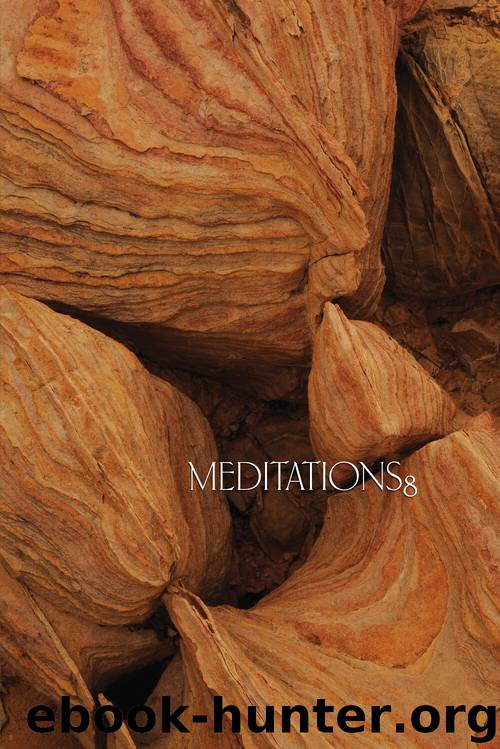Meditations8 by Thanissaro Bhikkhu

Author:Thanissaro Bhikkhu [Bhikkhu, Thanissaro]
Format: epub
Tags: Buddha, Buddhism, Dhamma, Dharma, Jhana, Meditation, Breath Meditation, Thai Forest Tradition, Pali Canon, Theravada
Publisher: Metta Forest Monastery
Published: 2017-07-25T07:00:00+00:00
Don’t Underestimate Merit
November 12, 2015
We’re meditating, which is a meritorious activity. Puñña is the Pali word. There’s no good English translation yet. Maybe someday someone will come up with a good one. We usually translate it as “merit,” and it sounds like Brownie points and merit badges. It creates an image of grasping at more happiness for yourself. And in a way it is, but we’re looking for a happiness that doesn’t create boundaries.
Most ways in which people look for happiness create boundaries because if happiness is dependent on having a particular relationship with a particular person or having a particular level of wealth, then when one person gains, somebody else has to lose. That kind of situation is what creates boundaries, creates divisions. As the Buddha said, it’s a blameworthy happiness because it depends on taking something from somebody else.
Whereas the forms of happiness that qualify as merit—and the Buddha says that activities of merit are another name for happiness—help to erase boundaries. Generosity: You’re giving something away to someone else. That creates a relationship right there, erases a boundary. When you buy or sell something, there’s a boundary. The fact that money has to change hands is what creates the boundary. But when something is given, that boundary gets erased.
The same with following the precepts: You realize that your true well-being has to depend on not harming other beings. So you don’t kill, you don’t steal, you don’t have illicit sex, you don’t lie, you don’t take intoxicants. At the same time, you’re looking after your own welfare because you don’t create the kind of kamma that will come back and bite you. Other people benefit; you benefit, too. In fact, when the Buddha talks about helping other people, it’s basically getting them to observe the precepts as well. After all, they are agents and they’re going to be reaping the results of their actions, so you want to encourage them to do things that will reap happiness for them.
And that moves into the meditation, which is also an activity in which you create happiness for yourself that spreads out to others. The fact that you’re dealing with your greed, aversion, and delusion—trying to make them weaker, trying to make them less likely to burst out of their cages and go prowling around the neighborhood: That means that other people are going to benefit. They don’t have to be victims of your greed or your aversion or your delusion.
So it’s good to remember that as we meditate here, it’s not just for us. We’re doing something that spreads its goodness around, spreads its happiness around, without any set boundaries.
Living as a monk makes this especially clear. Back when I was living in Thailand, it was frequent that when I was going for alms, some very, very poor people would put food in my bowl. I remember one couple in particular: There were just the two of them. They’d recently gotten married. They had a little shack just big enough for the two of them to sleep in and the rudiments of a kitchen out back.
Download
This site does not store any files on its server. We only index and link to content provided by other sites. Please contact the content providers to delete copyright contents if any and email us, we'll remove relevant links or contents immediately.
| Acupuncture & Acupressure | Aromatherapy |
| Ayurveda | Chelation |
| Chinese Medicine | Energy Healing |
| Healing | Herbal Remedies |
| Holistic | Homeopathy |
| Hypnotherapy | Massage |
| Meditation | Naturopathy |
| Reference |
Inner Engineering: A Yogi's Guide to Joy by Sadhguru(5887)
The Power of Now: A Guide to Spiritual Enlightenment by Eckhart Tolle(4749)
Fear by Osho(4083)
The Art of Happiness by The Dalai Lama(3377)
The Ultimate Bodybuilding Cookbook by Kendall Lou Schmidt(3309)
Yoga Therapy by Mark Stephens(3218)
Ikigai by Héctor García & Francesc Miralles(3130)
The Little Book of Hygge by Meik Wiking(3074)
Why Buddhism is True by Robert Wright(2819)
The Healing Self by Deepak Chopra(2792)
Being Aware of Being Aware by Rupert Spira(2702)
Shift into Freedom by Loch Kelly(2688)
Wild Words from Wild Women by Stephens Autumn(2584)
Work Clean by Dan Charnas(2557)
Happiness by Matthieu Ricard(2516)
The Hatha Yoga Pradipika (Translated) by Svatmarama(2477)
Yoga Body & Mind Handbook by Jasmine Tarkeshi(2462)
More Language of Letting Go: 366 New Daily Meditations by Melody Beattie(2436)
Why I Am Not a Feminist by Jessa Crispin(2235)
